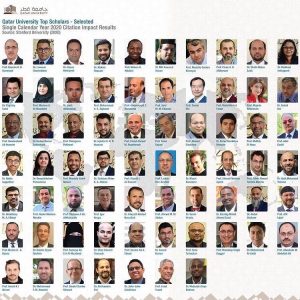
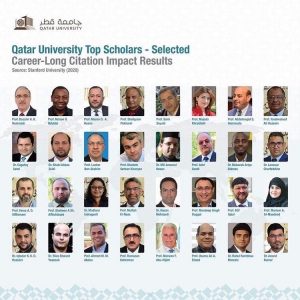
February 26, 2022 / Leave a comment
A team from QU, called Oryx, came second runner up in the local Microsoft Imagine Cup 2022. Imagine Cup brings together, every year, student innovators using passion and purpose to tackle social issues with tech. Each team creates an innovative solution from start to finish, while competing on a global stage for the title of World Champion. The Oryx team includes Raseena Haris, Jayakanth Kunhoth, Bajeela Aejas, and Najmath Ottakath. The team created Qalbee, a mobile system app for the early prediction of heart disorder risk, under the Health category. Using real-time ECG signals with the help of artificial intelligence algorithms.

The proposed system consists of a smart wearable band and a smartphone application. The smart wearable band is equipped with an ECG sensor and Bluetooth sensor. The embedded ECG sensor continuously records the impulses of the heart and transfers them to the smartphone application via Bluetooth. The smart application communicates with the AI decision-making model deployed in the cloud to predict the abnormality from the processed ECG signal. Upon detecting an anomalous heart rate, the user can be alerted along with authorities for further analysis or immediate action saving a life. The AI model is developed using a latest machine learning algorithm trained on the ECG dataset acquired from the public domain.
Congratulations for the team members!

February 20, 2022 / Leave a comment
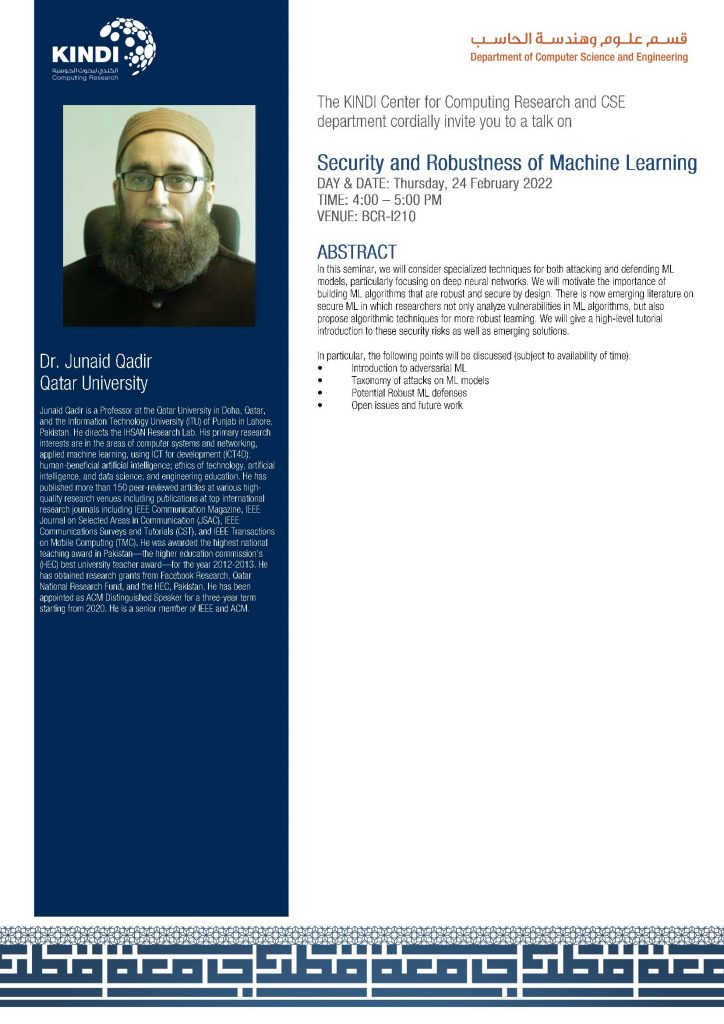
January 19, 2022 / Leave a comment


January 12, 2022 / Leave a comment
For English version, scroll down
يشرفنا أن تنضم إلينا في حدث توعوي حول الأمن السيبراني بجامعة قطر الذي يستمر من 7/2/2022 حتى 7/3/2022.يأتي هذا الحدث نتيجة تعاون كلا قسم علوم وهندسة الحاسب ومركز الكندي للحوسبة بكلية الهندسة
احضر هذه الجلسات التفاعلية مع متحدثين بارزين في مجال الأمن السيبراني. استمع إليهم وهم يناقشون أكبر التحديات التي تواجه الأمن السيبراني. تفاعل مع قادة صناعة تكنولوجيا المعلومات حول أحدث الاستراتيجيات والتقنيات والأدوات لضمان تأمين بياناتك واستخدام لشبكة المعلومات
سيعرض هذا الحدث العديد من الشركات والسلطات القطرية الواعدة. محتوى البرنامج موجه للأفراد العامة من المجتمع القطري و نحو قادة في صناعات مثل كيو سيرت ووزارة الداخلية والجزيرة وتناقش فيها أسس استخدام وتأمين البيانات في الشبكة ومواقع التواصل. ستتاح الفرصة للخبراء وأفراد الجمهور لتبادل المعرفة حول قضايا الأمن السيبراني الأكثر أهمية في هذا الحدث الحصري
س: ما أهمية أخذ التهديدات الإلكترونية على محمل الجد؟
ج: توفر الرقمنة والاتصال مزايا عديدة اليوم ، ولكن بتكلفة. تؤثر الهجمات الإلكترونية الآن على حياتنا اليومية وليس البيانات فقط. للسيطرة على هذه المخاطر وتجنبها ، تحتاج المنظمة إلى آليات أمنية شاملة وموقف مدرك لتأمين تلك الاستخدامات
The department of Computer Science and Engineering and the KINDI center for computing are cohosting Qatar University’s Cyber Security Awareness Event from February 7th to February 3rd, 2022.
Attend these interactive sessions with leading cybersecurity talkers. Hear them discuss the biggest challenges facing cyber security. Interact with leaders from the IT industry about the latest strategies, technologies, and tools to guarantee your personal or company’s cyber security.
This event will showcase several promising Qatari firms and authorities. The program content is geared towards the general public and QU students. Experts and members of the public will have the opportunity to share knowledge on the most critical cyber security issues at this exclusive event.
Q: Why does it matter taking cyber threats seriously?
A: Digitalization and connectivity offer numerous benefits today, but at a cost. Cyberattacks now impact our everyday lives and not just data. To control and avert this risk, individuals need comprehensive security mechanisms and a security-conscious attitude throughout.
For QU students:
Time | Topic/Title | Speaker | Language | Attendance/Venue | ||
7th FEB 2022 | 12:30PM – 2:00PM | Personal Security (Why you should have a strong password? Social engineering attacks and Identity theft?) | Dr Noora Fetais | ARABIC | Physical: C07-175 | Female ONLY |
Online: WebEx | Male & Female | |||||
9th FEB 2022 | 12:30PM – 2:00PM | Computer Security (What is malware? Types of Malware? Security against malware.) | Dr Noora Fetais | ARABIC | Physical: B05-231 | Male ONLY |
Online: WebEx | Male & Female | |||||
14th FEB 2022 | 12:30PM – 2:00PM | Internet Security (Internet, Email, Browser Vulnerabilities, Malvertising, Drive-by Downloads, Internet Security Best Practices) | Dr Armstrong Nhlabatsi | ENGLISH | Physical – C07-175 | Female ONLY |
Online: WebEx, YouTube | Male & Female | |||||
16th FEB 2022 | 12:30PM – 2:00PM | Mobile Security (Attacks on WiFi and Bluetooth; Attacks on Mobile Devices; Home WiFi security defenses; Precaution when using Public WiFi ) | Dr Armstrong Nhlabatsi | ENGLISH | Physical – B05-231 | Male ONLY |
Online: WebEx, YouTube | Male & Female | |||||
Attendance of the sessions is hybrid (both online and physical). Those attending physically will be issued with certificates of attendance. The sessions will broadcasted live on WebEx and YouTube but the physical audience will not be shown. Password for WebEx is security. Please register your interest :here
For Public participants:
Date | Time | Topic/Title | YouTube link | Venue | |
| 28th Feb 2022 | 4:00pm-5:00 pm | Risks related to Cybercrime |
| ||
7th March 2022 | 4:00PM – 5:30PM | News/stories verification: How can I verify the authenticity of news/stories circulation on Social Media? | H10 Auditorium |
January 5, 2022 / Leave a comment

Qatar University’s Computing Club (QUCC) held its first and the biggest university-wide programming competition, QUCCC’22, with the aim to prepare QU programmers to represent the State of Qatar in international programming contests. QUCCC’22 was sponsored by the Qatari Ministry of Defense, Huawei, and Snoonu. The competitive spirit between the students lasted until the very last second. The end of the competition brought light to three teams with potential to represent Qatar in international programming competitions. The “Apes Stick Together” team got the 1st place, while the 2nd and 3rd places were earned by “Hackerz” and “Badr” teams respectfully.
The competition was held on the 3rd January 2022, and lasted for three days attracting over 100 QU competitive programmers, QU CSE Department, and sponsor’s representatives. The contest was organized to emphasize the importance of developing and enhancing the technical skills of university students. The core QUCC organizing team included Ahmed Ashraf Abdou (President), Mahnoor Akhund (VP), Hani Jafer (Internal Relations Specialist), and Salha Al-Khayyat (Media Director).
Dr. Khaled Naji, Dean of the College of Engineering, said; “It was a pleasure to collaborate with QUCC to organize such programming competition, an educational program to stimulate the imagination of students, develop their skills, and encourage them to explore the broad possibilities of engineering and programming outside the scope of the classrooms to present different qualitative work in this field and in support of Qatar Vision 2030.”
Dr. Abdulla Al-Ali, Head of the CSE Department, stressed on the importance of this competition, which targets QU students to develop their skills and knowledge related to computing, in addition to graduating a generation of specialists in computer science and engineering, and providing the Qatari community with specialists in software developers, website designers, network engineers, and systems protection consultants.” He explained that the competition represents an opportunity to reveal students’ talents, creativity, and skills.
Mr. Abdullah Al Mulla, Director of Student Activities Department, pointed out that the students of QUCC took the initiative to organize such large-scale competition. “Through these initiatives and programs, students are able to highlight and refine their important technical abilities in the field of computing and their specialization, in addition to refining their personal and leadership skills, which will reflect positively on their academic aspect and student life.”, he said.
Henry Yee, Vice President of Huawei in the North Gulf, said: “We are proud to cooperate with one of the largest public universities in Qatar, which reflects our commitment to empowering ICT talent in Qatar, and supporting the country’s ambitious visions and plans in the digital transformation journey. We will continue our efforts in Huawei through open cooperation with our partners and joint work to build ecosystems for local ICT talent through our many initiatives, which include the ICT competition in the Middle East, Seeds for the Future and Huawei Academies that offer accredited certificates, and others in order to prepare tomorrow’s leaders”.
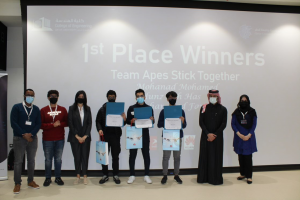
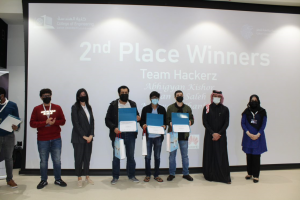
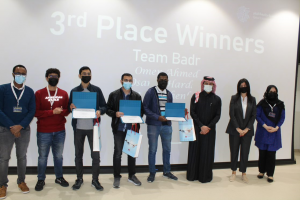
December 12, 2021 / Leave a comment
Qatar University (QU) and Qatar National Bank (QNB) have signed a Memorandum of Understanding (MoU) to cement the relationship between the two institutions in the fields of education, scientific research, and community development. The MoU comes into effect immediately.
The MoU aims to improve and enhance the knowledge for the university’s students in the fields of education, scientific research, executive training, social development as well as business management, IT, and public policies.
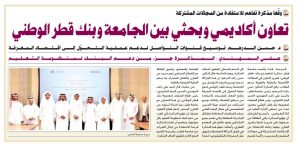
QU’s President Dr. Hasan Rashid Al-Derham and QNB’s CEO Mr. Ali Rashid Al-Mohannadi signed the MoU at Qatar University higher administration building. The first in a series of joint initiatives between QU and QNB is a research project on the local banking sector, including a detailed analysis of market trends and the impact of national and international regulations. Other initiatives under the MOU at Qatar University supports QNB’s program are in education and raising awareness in their banking sector, sponsorship of student activities and competition, and the possibility of forming working committees and joint teams and offering consultation in the engineering fields that fall within the scope of this memorandum. Eventually, the memorandum paves the way for the prospect of supporting conferences in the field of computing and smart things, in which researchers from all over the world are invited to present their latest findings in the field of cybersecurity, the Internet of things, the use of technology in the financial and administrative sectors, and more.
Dr. Al-Derham said: “The MoU highlights QU’s continuous efforts to provide solutions to local challenges, in line with national priorities towards a knowledge-based economy”. “It will also serve to facilitate knowledge and technology transfer and provide consultancy and research services, which will contribute to driving socio-economic development and sustainability in the state of Qatar,” he added.
Mr. Al-Mohannadi said: “Following long years of continuous and fruitful co-operation with Qatar University, Qatar’s primary educational institution, this comes as part of our support to education in all its areas and fields.” “We hope that this MoU provides an opportunity to exchange knowledge and to provide our utmost support to improve this agreement’s goals,” he added.
